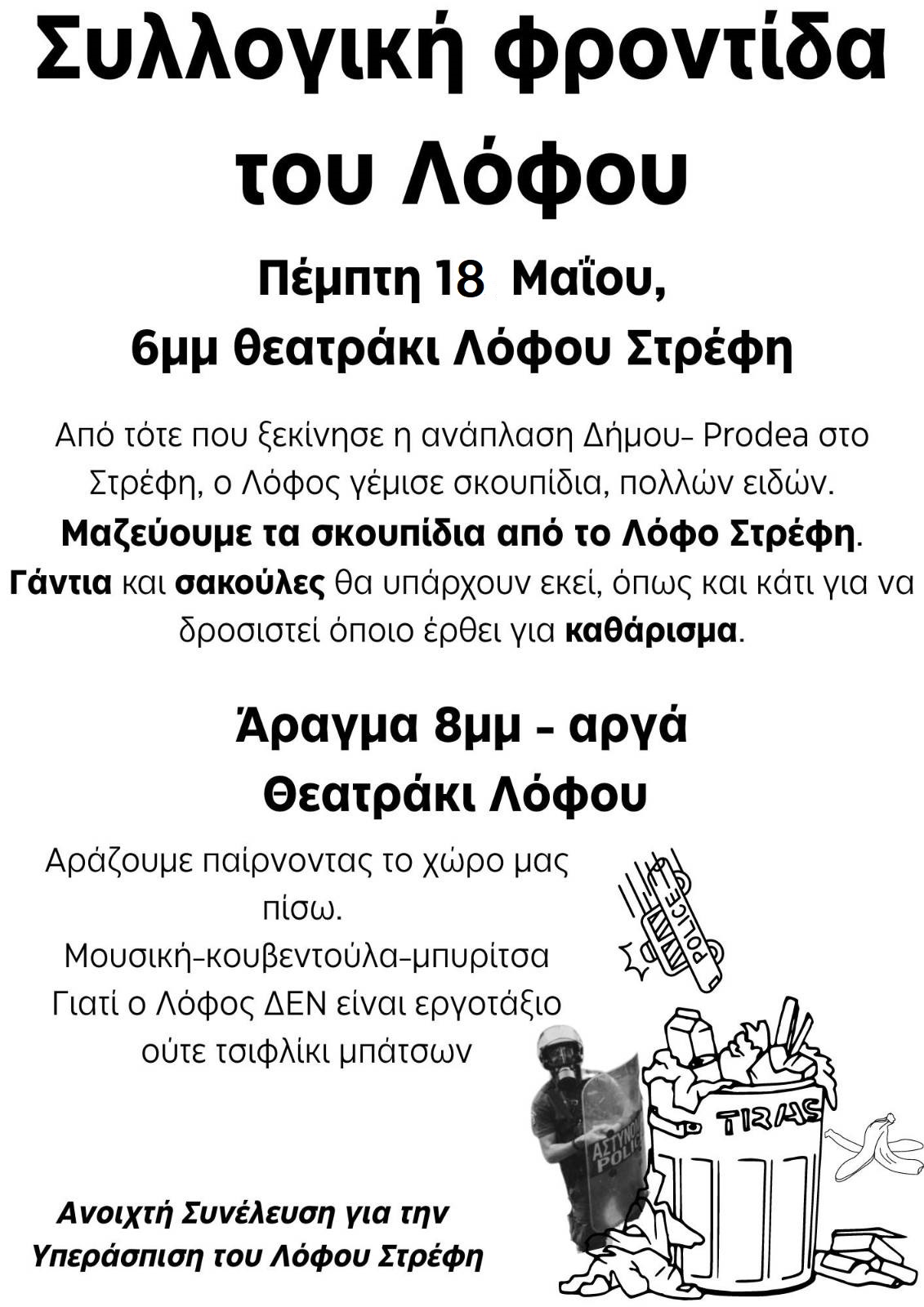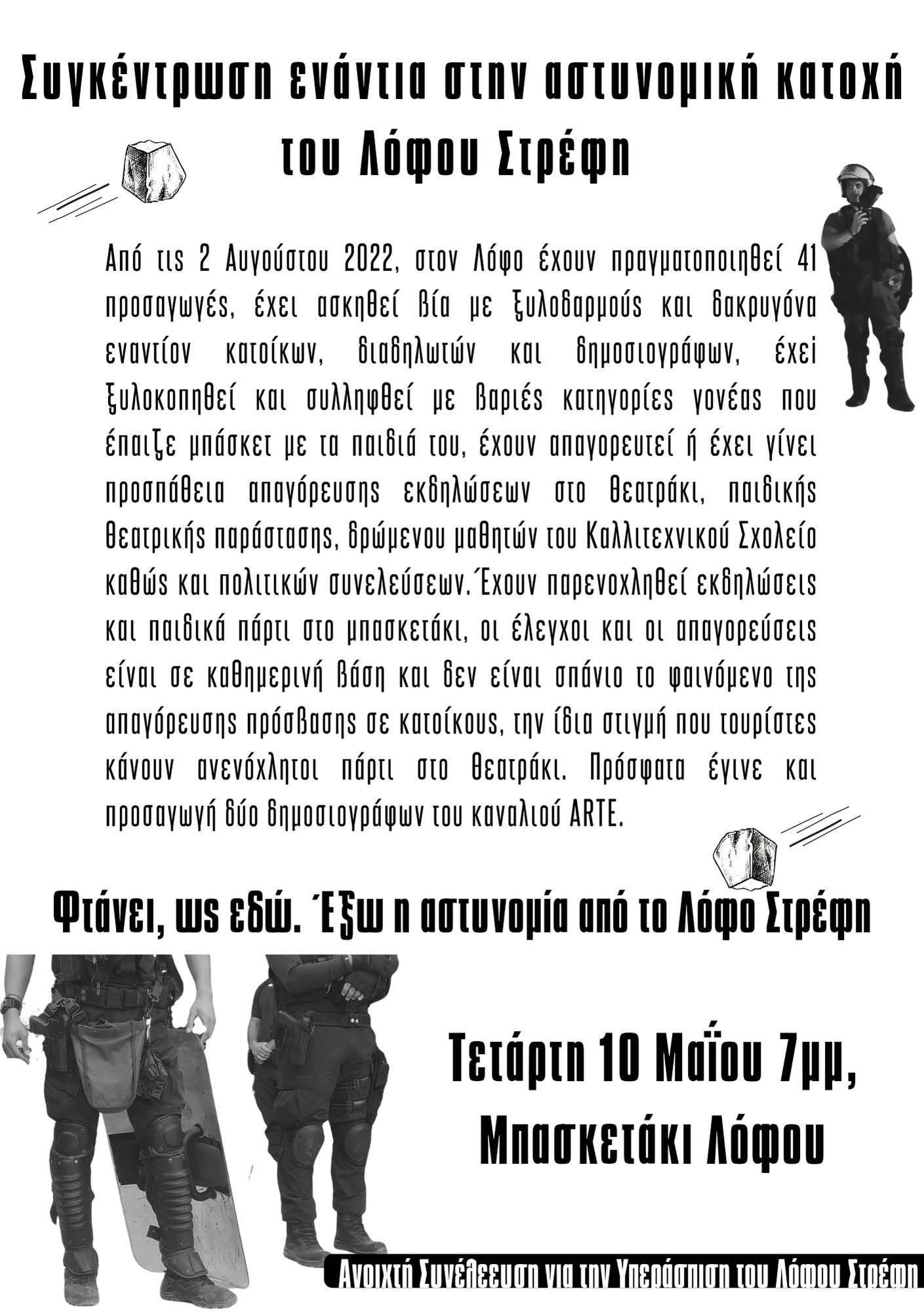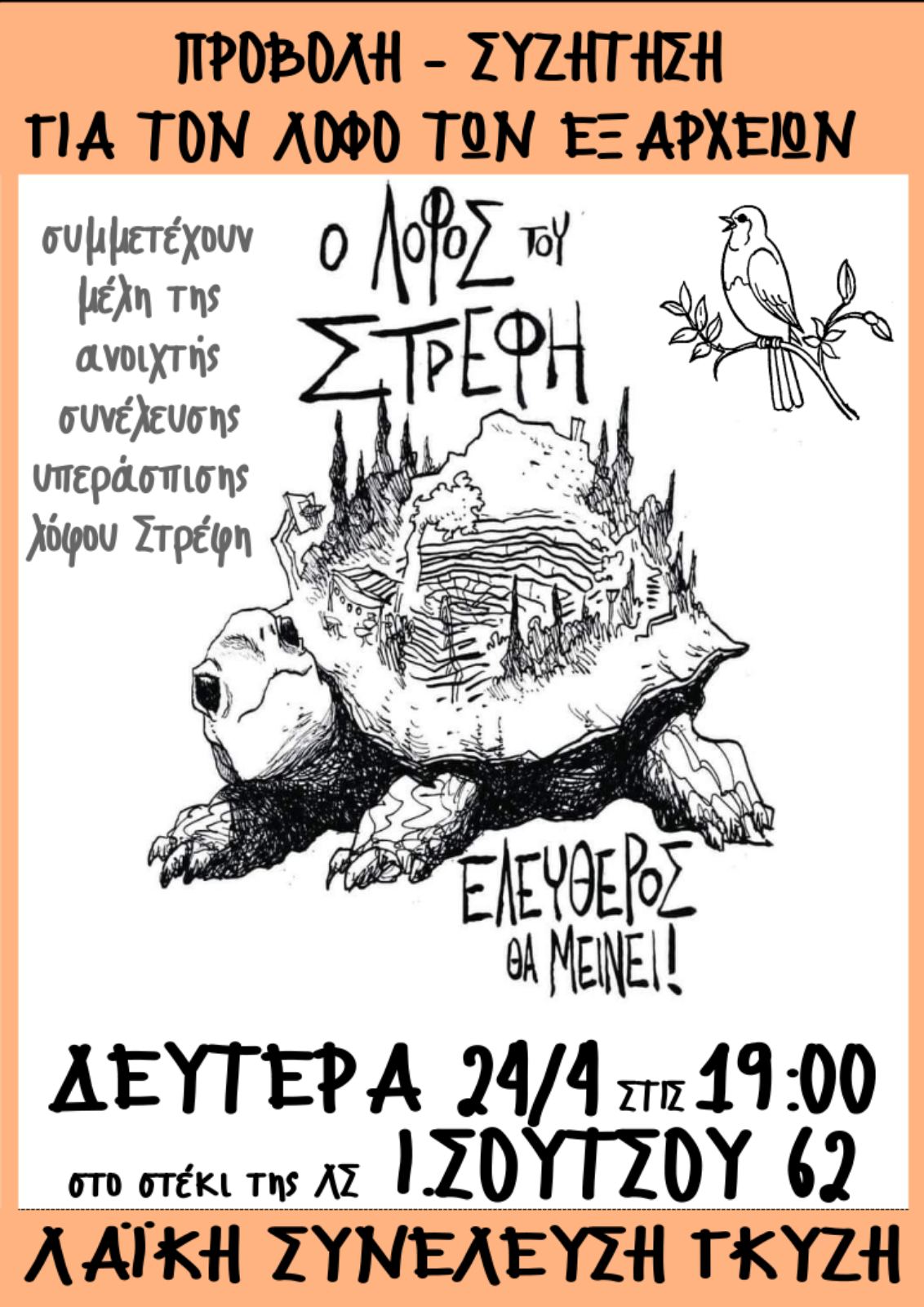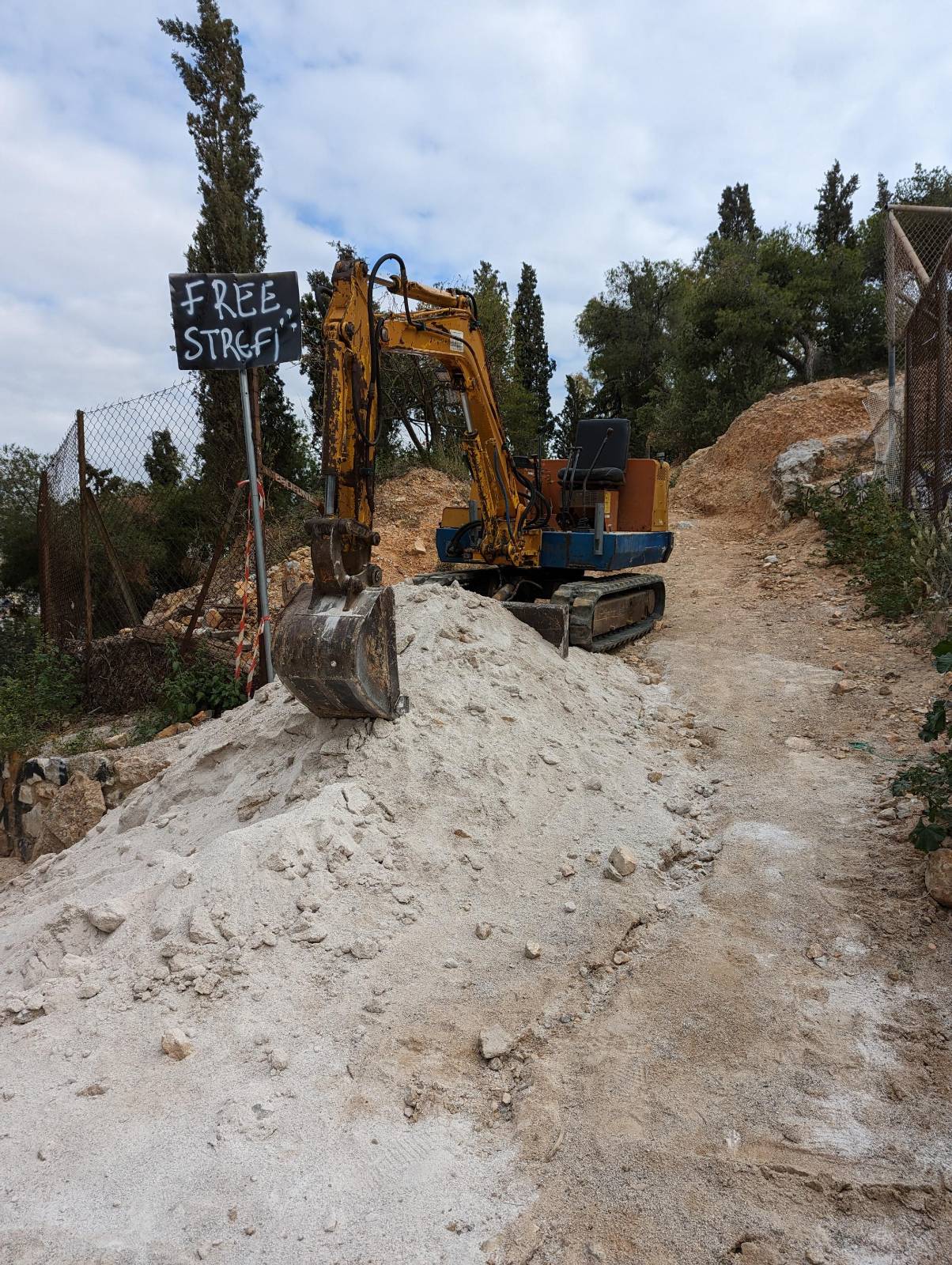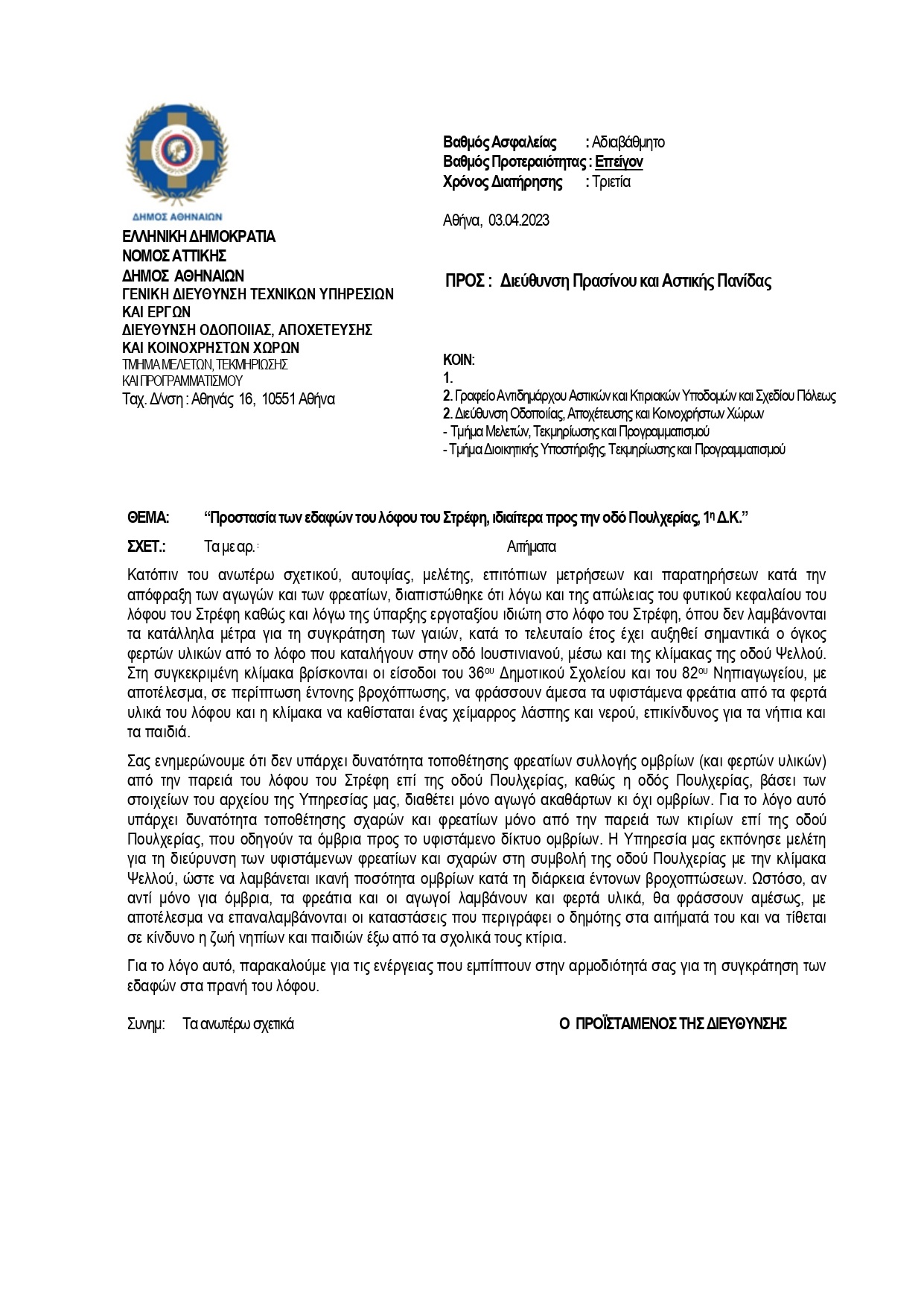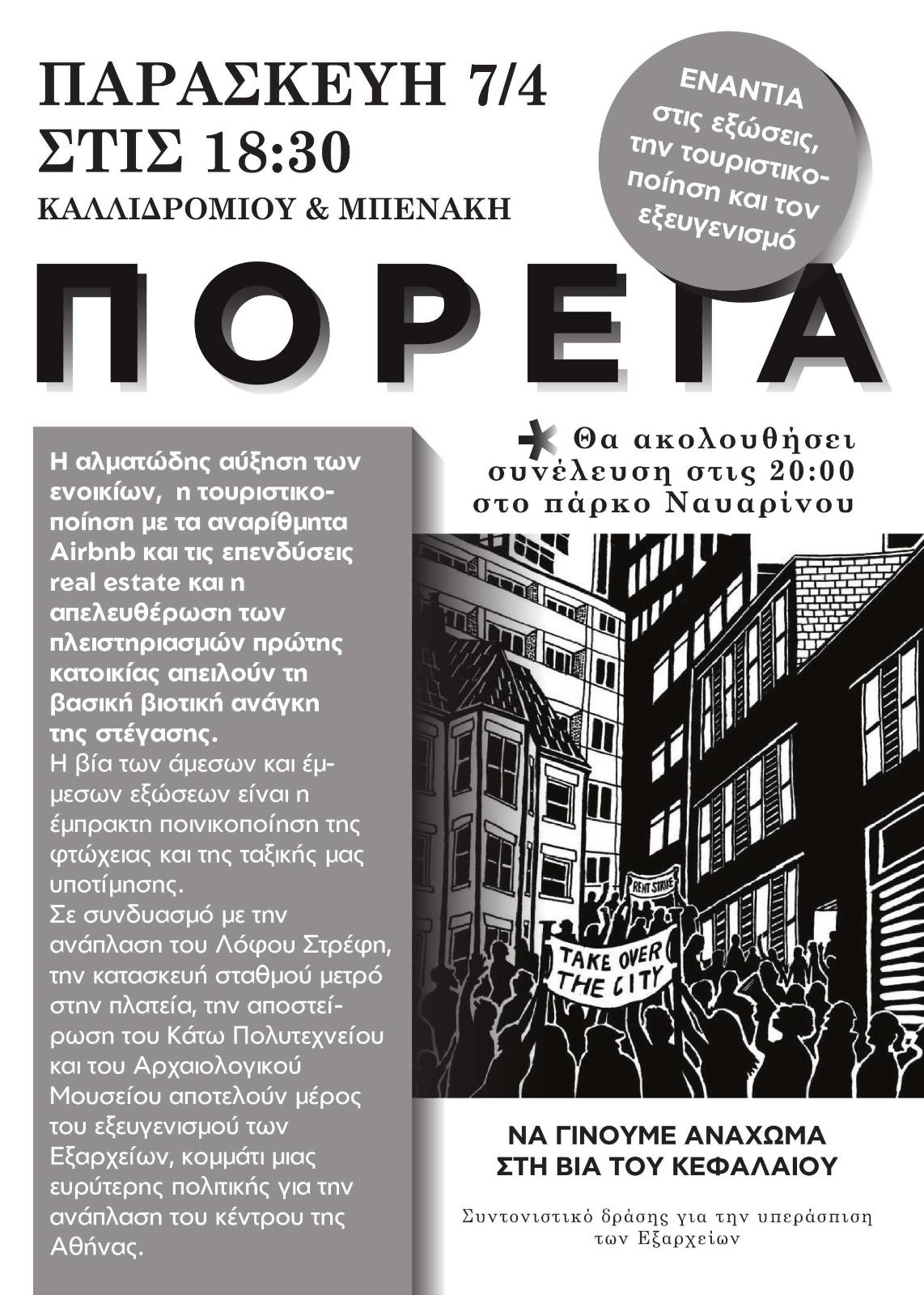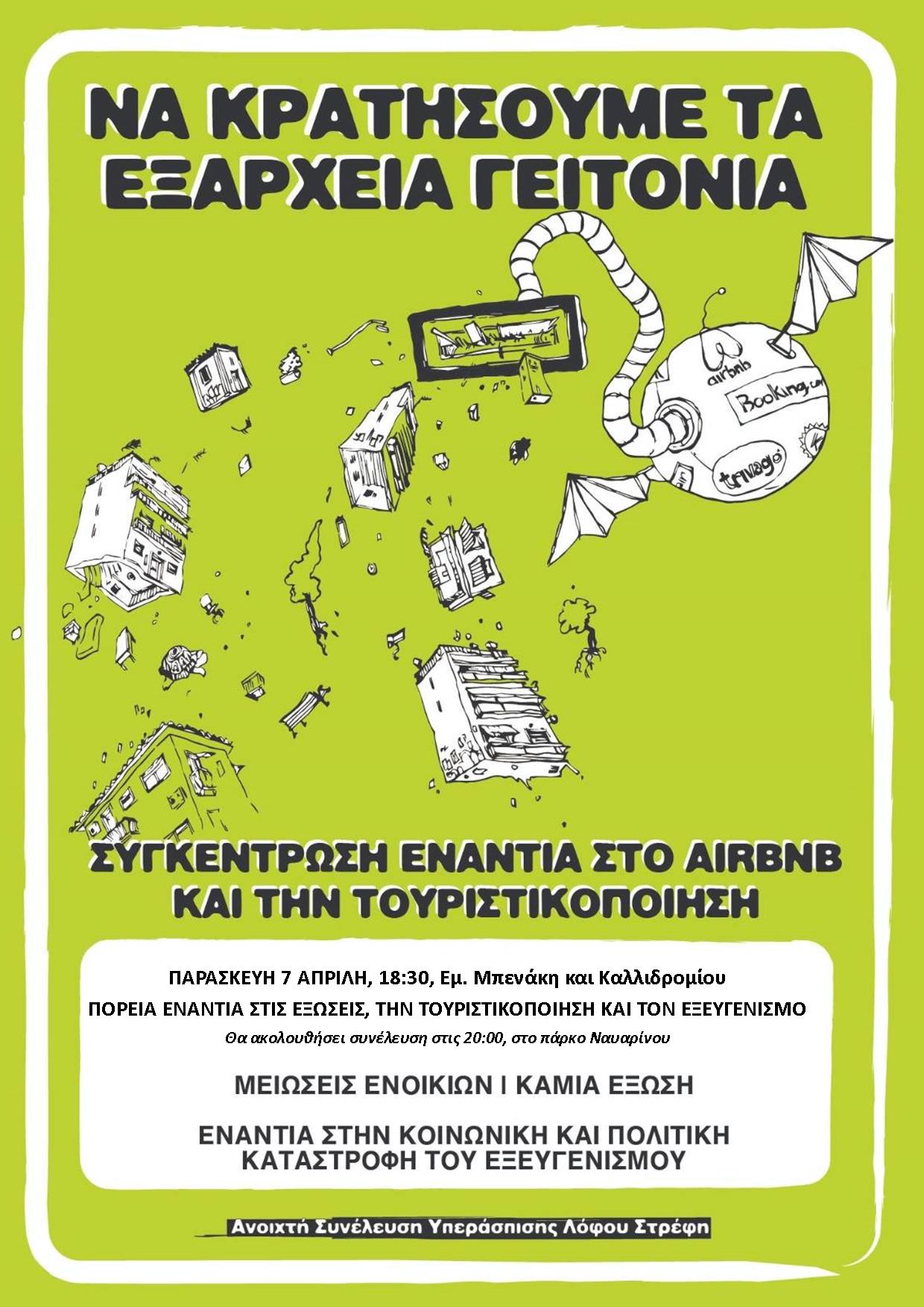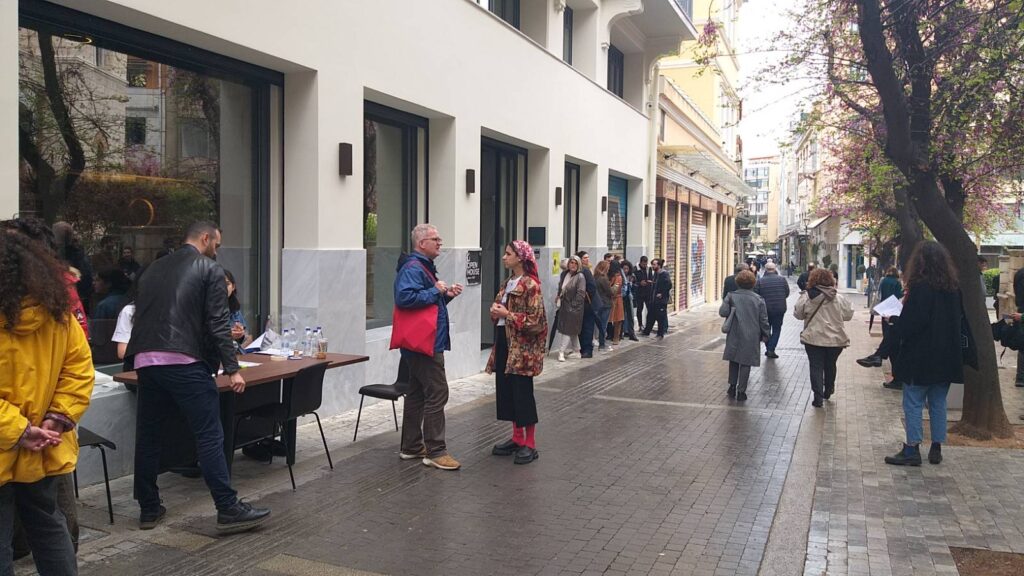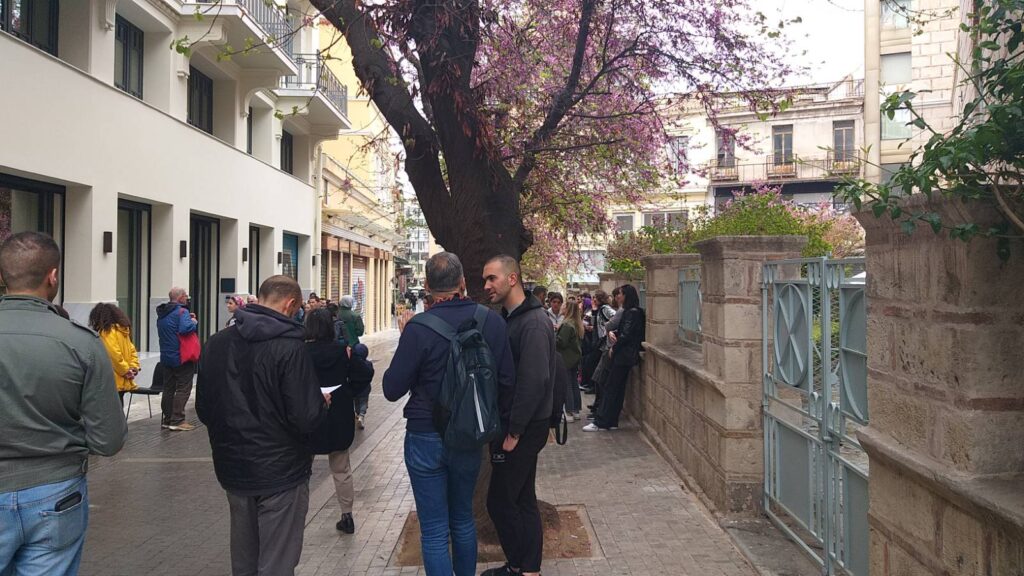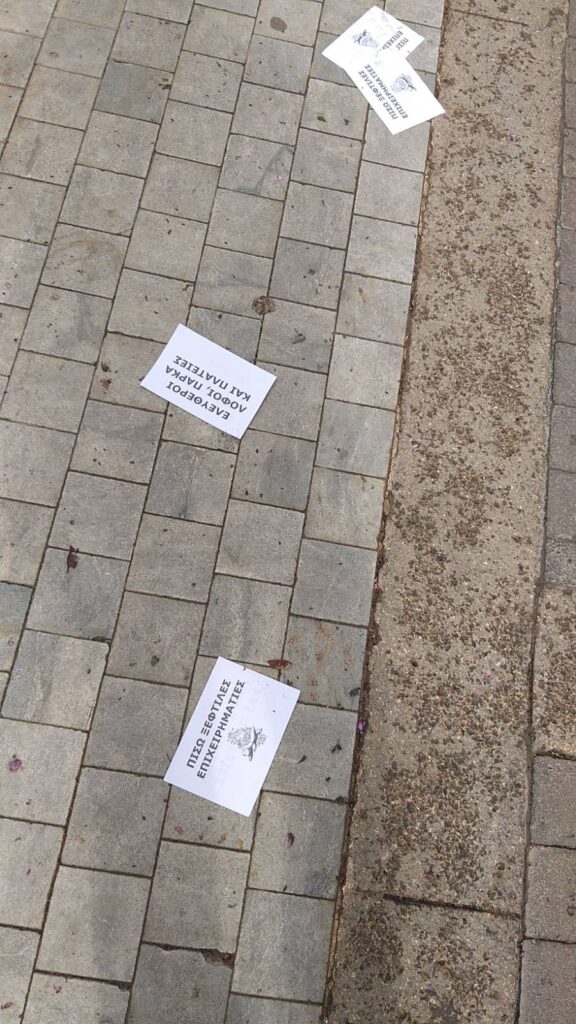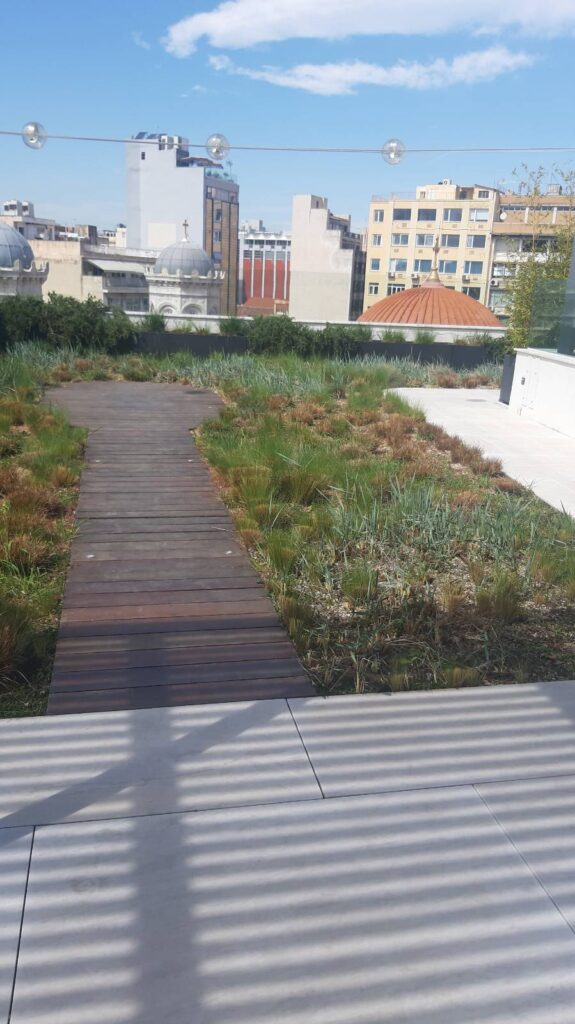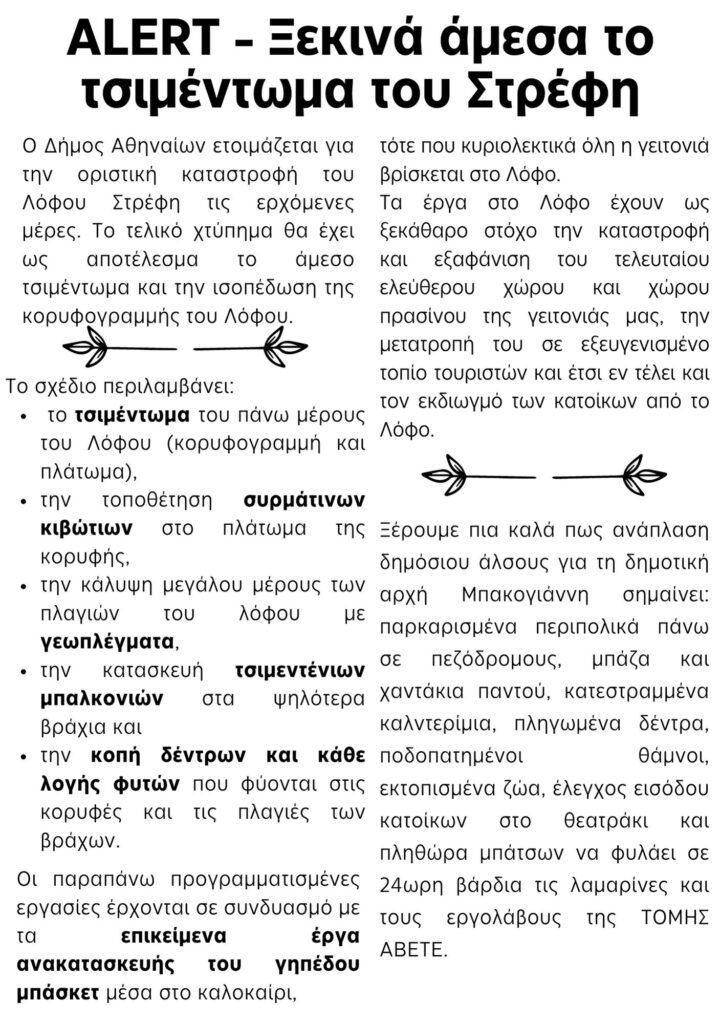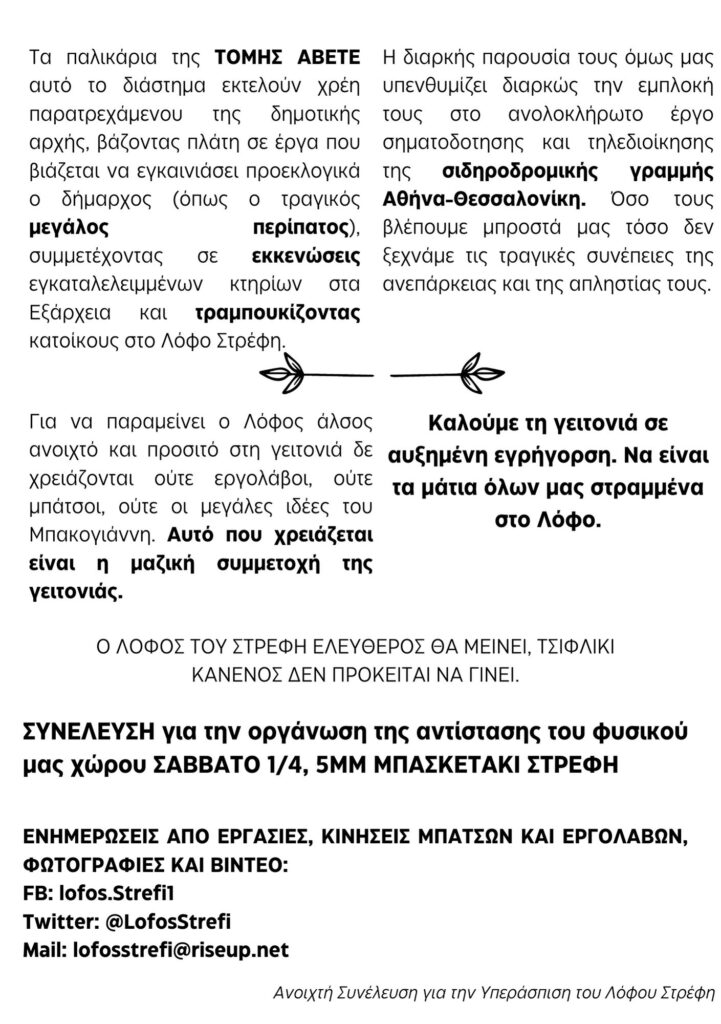Αυτές τις ανοιξιάτικες μέρες που οι εργολάβοι έχουν φύγει για τα χωριά τους και τα πουλιά και τα ζώα του Λόφου ζουν ήσυχα (με εξαίρεση τα σημεία με μπάζα, χαντάκια και ΟΠΚΕ), για να χαλαρώσουμε και μεις, αλλά και για να κρατάμε σε εγρήγορση τους Κλουζώ της ελληνικής αστυνομίας που μας παρακολουθούν, αλλά και τους μελετητές της Prodea (που πατάνε κατά λάθος like και καρφώνονται) και τα τσιράκια του Μπακογιάννη που δεν χάνουν λέξη από όσα ανεβάζουμε, αναδημοσιεύουμε το διήγημα “Δάφνη” του Ηλία Βενέζη, με αναφορές στον Λόφο Στρέφη του 1944. Να συμβάλλουμε και λίγο στην πνευματική τους καλλιέργεια (αν και αμφιβάλλουμε για το αποτέλεσμα).
Το διήγημα του Ηλία Βενέζη “Η Δάφνη” αναρτήθηκε στις 12/4/2023 από την ομάδα
Prolet connect (ο σύνδεσμος
εδώ), με ανάλυση και σχολιασμό.
Καλή ανάγνωση, καλήν άνοιξη και καλούς αγώνες!
Η περιοχή, ποὺ εἶναι στὴ βορινὴ πλευρὰ τοῦ λόφου τοῦ Στρέφη, γύρω στο πάρκο του Αρεως, ἦταν κείνη τὴν ἐποχὴ πολὺ ἔρημη. Δὲν εἶχαν φυτέψει ἀκόμα δέντρα, κι ὁ τόπος ἦταν ἕνα ξεροχώραφο ποὺ ἔπαιρνε, σὰ βράδιαζε, λίγο γαλάζιο φῶς ἀπ’ τὴν αὐστηρὴ γαλήνη των Τουρκοβουνιών. Πουλιά ξεμοναχιασμένα πετούσαν στις κουφάλες τοῦ λόφου, καὶ πότε-πότε παιδιὰ πήγαιναν ἐκεῖ γιὰ νὰ τὰ κυνηγήσουν. Μὰ αὐτὸ ἦταν μεγάλη περιπέτεια κι ὁ λόφος τοῦ Στρέφη ἔμενε, τὸ περισσότερο, μόνος καὶ ἥσυχος. Ακουγε τὸ ποτάμι ποὺ κατέβαινε πλάι ἐκεῖ καὶ παρακολουθοῦσε τὴν ἱστορία τῶν νερῶν ποὺ τραβούσαν νὰ βροῦν τὴ μοίρα τους στὴ θάλασσα τοῦ Σαρωνικού.
Σ’ ἐκεῖνα τὰ μέρη, στὸν ὁδὸ Ζαΐμη, ἦταν μια μικρή ταβέρνα μέσα σὲ αὐλὴ φυτεμένη μὲ λίγα δέντρα. Ἐκεῖ πήγαιναν ξεμοναχιασμένα ἀγόρια καὶ κορίτσια νὰ μιλήσουν γιὰ ἀγάπη καὶ νὰ φιληθοῦν. Ήταν φτωχοί σπουδαστὲς ποὺ ἔρχονταν ἀπ’ τὰ νησιὰ τοῦ Αἰγαίου καὶ ἀπ᾿ τὰ βουνὰ τοῦ τόπου τους, πρώτη φορὰ βλέπαν τόση μεγάλη χώρα, σὰν τὴν ᾿Αθήνα, καὶ πρώτη φορὰ δοκιμάζαν νὰ φύγουν γιὰ τὸ γοητευτικό ταξίδι ποὺ ἔχει μαῦρα μαλλιά, έχει καστανά μάτια, κ’ ἔχει στο νέο κορμὶ φόρεμα ἀπὸ φτηνό τσίτι. Ήταν δειλὰ παιδιά, δὲν ἔκαναν διόλου φασαρία, πίναν ούζο μὲ ἀμύγδαλα καὶ μέναν πολλή ώρα ήσυχα, ὥσπου να νυχτώσει καὶ νὰ βγοῦν τ’ ἄστρα. Τότε φιλοῦσαν τὰ κορίτσια τους, άκουγαν το μούμουρο τοῦ ποταμιοῦ καὶ λέγαν ἱστορίες τῶν θαλασσῶν καὶ τῶν βουνῶν τῆς πατρίδας τους.
Όμως μὲ τέτοια πελατεία ή ταβέρνα της οδού Ζαΐμη έκανε πολύ μέτριες δουλιές, κι ο ιδιοκτήτης της πολύ ζήλευε τοὺς συναδέλφους του της Πλάκας, του Ψυρή και ἄλλων θρυλικών τόπων.
–Τί νὰ κάνεις καὶ τί ζωὴ νὰ δεῖς μὲ τούτα τα μωρά! ἔλεγε μονάχος του. Αὐτὰ ἄλλα δὲν ξέρουν παρὰ νὰ κοιτάν τὸν οὐρανὸ καὶ ν’ ἀναστενάζουν. Τί ξέρουν από κρασί!
Ποτὲς δὲν τοῦ εἶχε τύχει νὰ δεῖ μεθυσμένη και γενναιόδωρη την πελατεία του. Μονάχα σε σπάνιες περιστάσεις, καὶ σὲ ὁρισμένες ἐποχὲς τοῦ χρόνου –στὶς ἀρχὲς τοῦ καλοκαιριοῦ καὶ σὰν τέλειωνε τὸ φθινόπωρο– τα πράματα ζωήρευαν κάτω ἀπ’ τὰ δέντρα τῆς ταβέρνας τῆς ὁδοῦ Ζαΐμη. Μόλις νύχτωνε, οἱ θόρυβοι καὶ τ’ ἀναστενάγματα των ἐρωτεμένων γίνονταν πιο ζωηρά, πότε-πότε φώναζαν μ’ ἐνθουσιασμό γιὰ νὰ παραγγείλουν διπλὰ πιοτὰ καὶ μεζέδες: ἦταν ὁ καιρὸς τῶν ἀποχαιρετισμῶν, ποὺ οἱ φοιτητὲς φεύγανε γιὰ τὰ μέρη τους, ὁ καιρὸς ποὺ γυρίζαν ἀπὸ κεῖ καὶ ξανασμίγαν μὲ τὴν ἀγάπη τους.
–Νὰ ἦταν κανένας τρόπος να κουνηθεῖ τοῦτο τὸ μαγαζί! ἔλεγε ὁ Θωμᾶς, ὁ ἄρχοντάς του. Μὰ τί νὰ σοφιστεῖς γιὰ νὰ κάνεις την πελατεία νὰ κατεβεῖ ἀπ’ τὰ μέρη τῆς Πλάκας! Είναι τόσο παράξενοι οἱ ἄνθρωποι!
Ήταν ἕνας παχὺς ἀγαθὸς ᾿Αθηναῖος μὲ μεγάλα μουστάκια κι αστραφτερά μάτια. Είχε καὶ κάτι ἐνοχλήσεις στην καρδιά του – οἱ γιατροὶ τοῦ εἶχαν πεῖ νὰ μὴ στενοχωριέται πολύ. Λοιπόν, μὲ τὴ συλλογὴ δὲ γίνεται τίποτα, άφηνε τὰ πράματα στην τύχη τους, κι ὅπως ἔρθουν.
Σ’ ἕνα ἀπ’ τὰ λίγα σπίτια τῆς περιοχῆς τοῦ λόφου τοῦ Στρέφη ἔμενε ἡ Δάφνη, ένα νέο κορίτσι με πράσινα μάτια, πολύ παράξενο. Ζοῦσε μὲ τὸν πατέρα της, ένα φτωχό καλλιτέχνη καί, ἐπειδὴ δὲν εἶχε κανέναν ἄλλο, ἔμαθε ἀπὸ μικρὴ νὰ κάθεται μονάχη καὶ νὰ ὀνειρεύεται. Γέμιζε, τότε, το δωμάτιό της ἀπὸ καβαλάρηδες με κόκκινες φορεσιές, ἀπὸ καράβια, ἀπὸ ψάρια κι ἄγρια θεριά. Ολ’ αὐτὰ πλέανε μὲς στὸ χῶρο τοῦ δωματίου, κ’ ἡ Δάφνη τριγύριζε ἀνάμεσά τους μὲ πολλὴ φιλία, καβαλικεύοντας ὅ,τι ἐπιθυμοῦσε. πότε ἕνα χρυσὸ ἄλογο, πότε ένα κόκκινο ψάρι, πότε μιὰ σκούνα. Σὰν ἔπιανε νὰ πέφτει ὁ ἥλιος κατὰ τὴ θάλασσα τοῦ Σαρωνικοῦ, ἡ Δάφνη ἀνέβαινε στο λόφο του Στρέφη. Περιπλανιόταν στις κουφάλες καὶ στοὺς βράχους, καὶ φανταζόταν πώς περνοῦσε ψηλές κορφές κ’ ἔρημες κοιλάδες. Άκουγε τὴ βουὴ τῆς πολιτείας ποὺ ἦταν πολύ μακριά, πέρα ἀπ’ τὰ σύνορα τοῦ Λυκαβηττοῦ, ἔβλεπε τὰ χρώματα να ταξιδεύουν στὴ θάλασσα καὶ στὰ βουνὰ τῆς Σαλαμίνας καὶ τὸ βράδυ γύριζε γοητεμένη στο σπίτι τους. «Η κοιλάδα ἦταν ἀπόψε ἔρημη», ἔλεγε στον πατέρα της.
«Ένα μεγάλο σύννεφο πέρασε ἀπ’ τὸ λόφο.» Τύχαινε νὰ γίνουν καὶ πράματα ἀκόμα πιο σημαντικά. «Ήρθε απόψε ἕνα πουλὶ μὲ πράσινη οὐρά, ἔλεγε. Νὰ ἦταν κοτσύφι;»
«Τὰ κοτσύφια δὲν ἔχουν πράσινη οὐρά, παρατηρούσε ὁ πατέρας της. Πότε λοιπὸν θὰ μάθεις να ξεχωρίζεις τοὺς ταξιδιῶτες τοῦ λόφου σου;»
«Κάποτε θὰ μάθω νὰ ξεχωρίζω ὅλα τὰ πουλιὰ τοῦ κόσμου», ἀποκρινόταν ἐκείνη μὲ πεῖσμα. Κ’ ἔπειτα:
«Ω, πατέρα, τί ξέρεις ἐσὺ γιὰ τὸ λόφο μου!» τοῦ ἔλεγε, καὶ θυμόταν τις καλοκαιρινές νύχτες, τὴν παράξενη φωνὴ τῆς γῆς ποὺ ἄκουγε σὰν ξαπλωνόταν πάνω στο ζεστὸ χῶμα, τὸ ψιθύρισμα τῶν βράχων, τὸ φλοίσβισμα τοῦ θυμαριού.
«Όλα μιλοῦσαν ἀπόψε στὸ λόφο», εἶχε πεῖ κάποτε στον πατέρα της.
«Αλήθεια μιλοῦσαν, ἀπόψε, ὅλα στο λόφο;»
Μὰ ἡ Δάφνη δὲν τοῦ ἀποκρίθηκε, γιατί ήξερε πως μοναχὰ αὐτὴ εἶχε τὸ προνόμοιο ν’ ἀκούει τὴ φωνὴ τῶν πραγμάτων.
Λοιπὸν ἡ Δάφνη γύρισε ένα βράδυ ἀπ’ τὸ λόφο τοῦ Στρέφη μ’ ἕνα ἀναπάντεχο εύρημα: μὲ μιὰ φωλιὰ ἀιτοῦ, ὁποὺ μέσα ἦταν ἕνα μικρὸ ἀμάλλαγο ἀντόπουλο. Κάτι μάγκες της Νεάπολης βρῆκαν τὴ φωλιά στ’ άγρια νταμάρια τοῦ Λυκαβηττοῦ καὶ εἶπαν: «Τὴν πᾶμε στο λόφο του Στρέφη, νὰ δοῦμε θὰ τὴ βρεῖ ὁ μεγάλος αυτός;» Κι ἔτσι, ἀντὶ νὰ τυραννήσουν τὸ ἀιτόπουλο, καταπώς σκέφτηκαν στην ἀρχή, τὸ πῆραν μὲ τὴ φωλιά του, κάμανε το μεγάλο ταξίδι ἴσαμε τὸ λόφο τοῦ Στρέφη, κ’ ἐκεῖ, σὲ μιὰ κουφάλα, το ἀποθέσανε καὶ φύγαν. «Μεθαύριο θα έρθουμε να δούμε», συμφωνήσανε.
Η Δάφνη εἶδε τοὺς μάγκες της Νεάπολης και, κρυμμένη κάπου ἐκεῖ, ἄκουσε τὴν κουβέντα τους. «Α το καημένο τὸ ἀιτόπουλο! σκέφτηκε. Άραγες θὰ ᾿ρθεῖ νὰ το βρεῖ ὁ μεγάλος ὁ ἀιτός, γιὰ θὰ τὸ σκοτώσουν οι μάγκες;»
Κείνη τὴ νύχτα δεν κοιμήθηκε καθόλου μὲ τὸ νὰ συλλογίζεται τὸ πουλί. Κι ὅταν τὰ χαράματα τὴν πῆρε ὁ ὕπνος, εἶδε ὄνειρο τὸ μεγάλο ἀιτό: οἱ φτερούγες του ήταν κατακόκκινες ἀπ’ τὸ αἷμα του ποὺ ἔτρεχε, καί, ὅπως χτυποῦσε τὰ σύννεφα σπαραχτικά, τὰ ἔβαφε κι αὐτὰ κόκκινα. Ξύπνησε τὸ πρωὶ ταραγμένη καὶ πῆγε ἀμέσως στην κουφάλα τοῦ λόφου. Ἔρημο, τουρτουρίζοντας ἀπ’ τὸ κρύο τῆς νύχτας, πεινασμένο, τὸ ἀιτόπουλο ἔμενε πάντα ἐκεῖ.
–Αχ, ὁ μεγάλος ὁ ἀιτὸς δὲ θά ‘ρθει, εἶπε καταλυπημένη ἡ Δάφνη. Είναι πληγωμένος καὶ θὰ πεθάνει μὲς στὰ σύννεφα. Τί θα γίνει τοῦτο ἐδῶ;
Σκέφτηκε πολύ, σκέφτηκε πως αὔριο, μπορεῖ καὶ τὴν ίδια μέρα, θὰ ρθοῦν οἱ μάγκες τῆς Νεάπολης καί, ἂν τὸ βροῦν, θὰ τὸ πάρουν τὸ ἀιτόπουλο καὶ θὰ τὸ τυραννήσουν.
Καὶ τότε πῆρε τὴν ἀπόφασή της:
Σήκωσε τὸ πουλί μὲ τὴ φωλιά του καὶ τό ‘φερε στον μπαρμπα–Θωμά, τὸν ἄρχοντα τῆς ταβέρνας τῆς ὁδοῦ Ζαΐμη. Ήξερε πὼς ἐκεῖνος καταλάβαινε ἀπὸ πουλιὰ καὶ τ’ ἀγαποῦσε, τρέφοντας ένα σωρό καρδερίνια καὶ φλώρια μέσα σε κλουβιά.
–Τί εἶν’ αὐτό, Δάφνη; ρώτησε ξαφνιασμένος ὁ ταβερνιάρης.
–Αχ ! κοίταξε, μπαρμπα-Θωμά! Σοῦ ἔφερα ένα ἀιτόπουλο!
Η Δάφνη τοῦ εἶπε ὅλη τὴν ἱστορία του πουλιού. Φύλαξέ το, μπαρμπα-Θωμά, ἴσαμε να μεγαλώσει καὶ νὰ κάμει φτερά. Τότε τὸ ἀφήνεις.
Τὸν παρακάλεσε θερμά, τόσο ποὺ ὁ ἄνθρωπος το δέχτηκε.
–Καλά, Δάφνη. Δὲ ματακούστηκε να φυλάν στα κλουβιὰ ἀιτούς. Όμως, γιὰ χατήρι σου, θὰ το κρατήσω. Γιατί, βέβαια, τί θ᾽ ἀπογίνει ἂν τὸ ἀφήσουμε;
Κεῖνο τὸ βράδυ ὁ μπαρμπα-Θωμᾶς ἔβαλε τὸ ἀιτόπουλο σ’ ἕνα μεγάλο κλουβί, τοῦ ἔβαλε ρύζι, πράσινα φύλλα καὶ νερό. Μὰ τὸ μικρὸ ὄρνιο δὲν ἄγγισε τίποτα.
–Τί θὰ γίνει μὲ τοῦτο; εἶπαν τὴν ἄλλη μέρα ὁ μπαρμπα-Θωμᾶς κ’ ἡ Δάφνη. Αν πάει ἔτσι, σίγουρα θα ψοφήσει.
–Εἶναι πολὺ μικρὸ ἀκόμα καὶ ἄμαθο, εἶπε τὸ κορίτσι. Δὲ θὰ μπορέσει να κάμει χωρίς μάνα.
–Καὶ ποῦ νὰ βροῦμε τὴ μάνα του; Βέβαια, δε μποροῦμε νὰ τὴ φωνάξουμε.
–Βέβαια δὲ μποροῦμε νὰ τὴ φωνάξουμε, ἐπανάλαβε μηχανικὰ τὸ κορίτσι.
Ηταν πολύ λυπημένη ἐπειδὴ ἔβλεπε πὼς τὸ ἀιτόπουλο ἦταν καταδικασμένο.
–Αν βρίσκαμε τὴ μάνα του, ἂν τοῦ βρίσκαμε μια μάνα… μονολογοῦσε.
Κ’ ἔτσι ποὺ τὸ συλλογιζόταν, ξαφνικὰ τὰ μάτια της πέσαν κάπου.
–Αν δοκιμάζαμε… Αν δοκιμάζαμε αυτό…, μουρμούρισε.
Ο μπαρμπα-Θωμᾶς γύρισε καὶ τὴν κοίταξε με ἀπορία:
–Ω ναι! Ναί! Ας τὸ δοκιμάσουμε! εἶπε τὸ κορίτσι αποφασιστικά. Θὰ τοῦ δώσουμε μια μάνα! Μπαρμπα-Θωμά, μὴν πεῖς ὄχι!
Καὶ τοῦ εἶπε τὴν ἰδέα της: Σ’ ένα απ’ τα πολλά κλουβιὰ τῆς ταβέρνας ήταν και μια πέρδικα – μεγάλη τρυφερότητα του μπαρμπα-Θωμά. Ήταν ένα ήσυχο πουλί, πολύ μονάχο και έρημο. Λοιπόν, γιατί να μην το βάζανε μαζὶ μὲ τὸ ἀιτόπουλο;
–Μπορεῖ ἔτσι νὰ βοηθήσουμε και την πέρδικα, είπε ἡ Δάφνη.
Ο μπαρμπα-Θωμάς ξαφνιάστηκε.
–Όχι! Όχι! Πως γίνεται; έλεγε. Η πέρδικα είναι ήμερο πουλί, ἀδύναμο, κι ὁ αϊτὸς εἶναι ἄγριο. Θα τη σπαράξει, σίγουρα! Κι ἂν δὲν μπορεῖ νὰ τὸ κάνει τώρα, γιατί δὲν ἔχει δύναμη, θὰ τὸ κάνει μόλις μεγαλώσει λίγο. Όχι, Δάφνη!
–Ελα, μπαρμπα-Θωμά! τὸν ἱκέτευε εκείνη. Θα δεῖς ποὺ δὲ θὰ τὴν πειράξει. Θὰ τὸ δεῖς που θα συνηθίσουν. Ξέρω ἐγὼ ἀπὸ πουλιά. Κ’ ἔπειτα, ἂν δεῖς πως είναι φόβος, τότε τὰ χωρίζουμε.
Τον παρακάλεσε πολύ, που στο τέλος, όπως της εἶχε μεγάλη αδυναμία, κι όπως ποτέ του δὲν εἶχε ἀλύγιστη θέληση, κλονίστηκε:
–Καλά, εἶπε. Θὰ δοκιμάσουμε.
Κ’ ἔτσι ἔγινε. Βάλαν στο μεγάλο κλουβί της πέρδικας καὶ τὸ μικρὸ ἀιτόπουλο. Την πρώτη μέρα ή πέρδικα συμαζώχτηκε σὲ μιὰν ἄκρη τοῦ κλουβιοῦ, τὸ ἀιτόπουλο στην άλλη άκρη. Τὸ ἕνα πουλί ἔριχνε περίεργες ματιές στὸ ἄλλο, πότε έχτρικές, πότε φοβισμένες. Ως τὸ βράδυ κανένα δεν τόλμησε να σαλέψει καὶ νὰ πάει κοντά στο ἄλλο. Καὶ τὴ νύχτα ἔμειναν τὸ καθένα σταλιασμένο στη γωνιά του. Τὸ ἀιτόπουλο συλλογιζόταν τὰ βουνὰ καὶ τὴ λευτεριὰ τῶν προγόνων του, κ’ η πέρδικα συλλογιζόταν τὰ παιδιὰ ποὺ θὰ εἶχε καὶ ποὺ θὰ μεγάλωνε κάτω ἀπὸ ζεστές πέτρες.
Τὴν ἄλλη μέρα, σὰν ξημέρωσε, ἦρθε ἡ Δάφνη. Μὲ τὸ μπαρμπα-Θωμά πήγαν στο κλουβί, άλλαξαν τὸ νερὸ καὶ βάλαν φρέσκα φύλλα πλάι σὲ κάθε πουλί.
–Έλα τώρα! εἶπε τὸ κορίτσι τρυφερὰ στὴν πέρδικα, εσύ ‘σαι πιὸ μεγάλη κι αὐτὸ εἶναι μωρό. Πρέπει να γίνεις ἡ μάνα του.
Επιασε μὲ τὸ χέρι της τὴν πέρδικα καὶ τὴν ἔφερε κοντὰ στὸ ἀτάραχο ἀιτόπουλο. ᾿Αλλὰ μόλις τράβηξε το χέρι της, ἡ πέρδικα γύρισε βιαστικά στον τόπο της.
–Καλά, καλά, εἶπε ἡ Δάφνη. Καταλαβαίνω, είναι ἴσαμε ποὺ νὰ τὸ συνηθίσεις. Ὅμως ξέρω πως θα γίνεις ἡ μάνα του.
Αὐτὸ βάσταξε κάμποσες μέρες, κ’ ἡ Δάφνη με τον μπαρμπα – Θωμᾶ παρακολουθούσαν μὲ περιέργεια καὶ ἀγωνία τὴν ἱστορία του κλουβιού. Το πράμα μαθεύτηκε στοὺς ἀραιοὺς πελάτες της ταβέρνας και, ὅταν ἐρχόταν τὸ βραδάκι, ὅλοι ὅσοι ἔμπαιναν ρωτοῦσαν ειρωνικά:
–Λοιπόν, τί νέα, μπαρμπα-Θωμά; Αγαπήσανε;
–Περιμένετε λίγο ἀκόμα, τοὺς ἀποκρινόταν. Θα δεῖτε πὼς θὰ ἀγαπήσουν.
Ἡ βεβαιότητα τοῦ κοριτσιοῦ σιγά-σιγὰ εἶχε μεταγγιστεῖ μέσα του, καὶ ἀπὸ ἕνα παράξενο αίσθημα τὸ καταλάβαινε σὰ χρέος του νὰ ὑπερασπίσει τα πουλιά μπροστά στὶς ὑποψίες τῶν ἀνθρώπων.
–Ἕνας ἀιτὸς μὲ μιὰ πέρδικα! Γίνεται, μπάρμπα-Θωμά;
–Εγώ λέω πὼς ὅλα γίνουνται μὲ τὰ πουλιά. Όλα ὅσα δὲ γίνουνται μὲ τοὺς ἀνθρώπους.
Κι ἀληθινά, ἔγινε ὅπως τὸ πίστεψε ἡ Δάφνη. Σε λίγες μέρες ή πέρδικα πλησίασε πρώτη, μὲ ἔνστιχτο μητρικό, τὸ ἀπορφανισμένο ἀιτόπουλο. Στὴν ἀρχὴ τὸ περιεργάστηκε, ύστερα τὸ ἄγγισε μὲ τὶς φτερούγες της, ὕστερα ἔσκυψε κ’ ἔφαγε ἀπ’ τὴν τροφή του. Σὰ νὰ τοῦ ἔλεγε: « Σκύψε κ’ ἐσὺ καὶ φάε!» Καὶ τὸ ἀιτόπουλο ἔσκυψε κ’ ἔφαγε, έσκυψε και ήπιε, ὅπως ἔκανε ἡ πέρδικα. Μέρα μὲ τη μέρα ή μελαγχολία του λιγόστευε καὶ γινόταν πιο ζωηρό. Ένα βράδυ έριξε ψιλή βροχή. Ο μπαρμπα-Θωμάς πήγε για να πάρει μέσα το κλουβί καὶ νὰ τὸ προφυλάξει. Τότε είδε τὴν πέρδικα, ποὺ εἶχε σταλιάξει κοντὰ στὸ ἀιτόπουλο, νὰ ἔχει ἀπλωμένα πάνω του τὰ φτερά της καὶ νὰ τὰ προφυλάγει ἀπ’ τὸ νερό.
–Ω, Θέ μου! εἶπε συγκινημένος. Τόσο πολὺ δὲν το πίστευα. Δὲν τὸ πίστευα πὼς θὰ φτάνανε ἴσαμε κει.
Τὸ μάθαν οἱ ἀραιοί πελάτες της ταβέρνας καὶ τὸ εἶπαν ξαφνιασμένοι ὁ ἕνας στὸν ἄλλο. Τὸ εἶπαν καὶ σὲ φίλους τους ποὺ δὲν ἔρχονταν στὴν ταβέρνα. Κ’ ἐκεῖνοι, για νὰ δοῦν τὸ ἀξιοπερίεργο, άρχισαν νὰ ἔρχουνται. Σιγά-σιγὰ ἡ πελατεία ζωήρευε, μεγάλωνε, κάθε μέρα πιο πολύ.
–Πᾶμε νὰ δοῦμε τὸν ἀιτὸ μὲ τὴν πέρδικα στην οδό Ζαΐμη; λέγαν,
Περιεργάζονταν πρῶτα τὰ πουλιὰ κ᾿ ὕστερα κάθονταν νὰ πιοῦν.
–Εἶναι παράξενο. Δὲν εἶναι;
–Είναι μικρὸ τὸ ἀιτόπουλο, γι’ αὐτὸ δὲν τὴν πειράζει, λέγαν οἱ πιὸ πολλοί, ἄνθρωποι που βασίζονταν στη σοφία τῶν χρόνων τους. Ας μεγαλώσει λίγο καὶ θὰ δοῦμε!
–Μὰ μπορεῖ νὰ γίνει ἀλλιῶς; Μόλις μεγαλώσει θα τη σπαράξει καὶ θὰ τὴ φάει!
Ο καιρός περνοῦσε, ὁ ἀιτὸς μέρα μὲ τὴ μέρα μεγάλωνε, κ’ ἡ ἀνυπομονησία τῶν ἀνθρώπων μέρα μὲ τὴ μέρα γινόταν πιὸ ζωηρή. Ἔρχονταν ὁλοένα πιο πολλοί, και μόλις μπαίνανε στὴν αὐλή, πρὶν ἀκόμα δοῦν τὸ κλουβί, ρωτοῦσαν ἀνήσυχα:
Ὅλοι περίμεναν ν’ ἀκούσουν τὸ «ναί», σὰ νά ‘θελαν ἔτσι νὰ ἡσυχάσουν. Σχεδὸν ἀπογοητεύονταν ἅμα τους δίναν τὴν ἀπόκριση:
–Α, μὰ θὰ γίνει! Θὰ γίνει! λέγαν με σιγουριά καὶ πεῖσμα. Αὐτὸ δὲ μπορεῖ νὰ βαστάξει ἀκόμα πολύ.
Τοὺς εἶχε ἀναστατώσει το στραπάτσο τῆς ἁρμονίας που υπάρχει στον κόσμο: οἱ δυνατοὶ νὰ σπαράζουν τὸν ἀδύνατο. Τοὺς ἐρχόταν ολωσδιόλου ἄβολα νὰ μὴ γίνει μὲ τὰ πουλιὰ αὐτὸ ποὺ γίνεται μὲ τοὺς ἀνθρώπους.
Ήταν τόση ἡ βεβαιότητά τους που, σιγά-σιγά, ἄρχισε πάλι να μπαίνει ἡ ἀμφιβολία καὶ στὴν ἀδύναμη καρδιὰ τοῦ μπαρμπα-Θωμᾶ καὶ νὰ φεύγει ἡ πίστη του τοῦ εἶχε μεταγγίσει ἡ Δάφνη. Πάλευε ανάμεσα στα δυο ρέματα. Τὸ ἀιτόπουλο τώρα πιὰ εἶχε μεγαλώσει πολύ. Αν τὸ ἤθελε θὰ μποροῦσε χωρὶς τὸ παραμικρό κόστος νὰ τὴ σπαράξει τὴν πέρδικα. Κι αὐτὴ ἦταν τόσο ἀνυπεράσπιστη!
Τις νύχτες, ὅταν οἱ πελάτες εἶχαν φύγει κ’ ή ταβέρνα ἦταν σκοτεινὴ κι ἔρημη, πήγαινε κοντὰ στὸ κλουβί καὶ ἀφουγκραζόταν. Τίποτα, ἡσυχία ἦταν κεῖ μέσα, καὶ ἅμα τα μάτια του συνήθιζαν στο σκοτάδι ἔβλεπε τα μάτια τοῦ ἀιτοῦ ἀκίνητα καὶ λυπημένα νὰ λάμπουν μὲς στη νύχτα.
–Μπὰς καὶ πρέπει νὰ τὸ ἀφήσω; Μπὰς καὶ μοῦ σπαράξει τὴν πέρδικα;
Όμως ἦταν ἄνθρωπος κι αὐτός, κ᾽ εὐθὺς ἀμέσως τὸ συλλογιζόταν:
–Αν τὸ ἀφήσω, ὅλη τούτη ἡ εὐλογία τοῦ Θεοῦ που μοῦ ἦρθε θὰ μοῦ φύγει, ἔλεγε γιὰ τὴν ἀναπάντεχη πελατεία του. Δὲ θά ‘ναι πιὰ τίποτα ἐδῶ ποὺ νὰ τοὺς τραβά.
Δειλά-δειλὰ ρωτοῦσε καὶ τὴ Δάφνη:
–Ἐσὺ τί λές; Πρέπει νὰ τ᾿ ἀφήσουμε το πουλί;
Δὲν τῆς ἔλεγε ὅλες τὶς σκέψεις του καὶ τοὺς ὑπολογισμούς του. Όμως ἐκείνη, μ’ ὅλον ποὺ ἦταν ἀκόμα μικρή, εἶχε βαθὺ ἔνστιχτο καὶ καταλάβαινε τοὺς ἀνθρώπους.
–Ξέρω, μπαρμπα-Θωμά, ξέρω γιατί με ρωτάς. ᾿Αλλὰ ἐσὺ τί λές; Φοβᾶσαι γιὰ τὴν πέρδικα;
–Δὲν ξέρω πιὰ τί νὰ πῶ, ἀποκρινόταν ταραγμένος. Όμως τώρα ὁ ἀιτὸς μεγάλωσε καί, ἂν τὸν ἀφήναμε, θὰ μποροῦσε νὰ πετάξει. Όμως πάλι…
–Μποροῦμε νὰ τὸν κρατήσουμε ἀκόμα λίγο, τοῦ ἔλεγε ἐκείνη μὲ συγκατάβαση. Καὶ πίστευε σ’ εμένα, μπαρμπα-Θωμά. Μη φοβάσαι.
Στο μεταξύ, οι άνθρωποι που μάθαν να έρχονται στην ταβέρνα της οδού Ζαΐμη για να παρακολουθήσουν την ιστορία των πουλιών άρχισαν πια να μη βαστιούνται. Η απογοήτεψή τους ήταν ολοφάνερη επειδή ο αϊτός δεν κατασπάραζε, όπως θα έπρεπε, την πέρδικα.
–Ωχ αδερφέ! Λέγαν φουρκισμένοι. Αυτό το πράμα πια δεν είναι αϊτός! Το χάλασε η πέρδικα.
Κι ένα βράδυ έγινε τούτο: ένας απ’ τους πελάτες είχε πιει πολύ κρασί, κι όπως ήρθε η κουβέντα στον αϊτό και στην πέρδικα, πετάχτηκε απάνου, χίμηξε αγαναχτισμένος στο κλουβί, έχωσε μέσα το χέρι του, χούφτιασε το αϊτόπουλο κι άρχισε να το κουνά με οργή φωνάζοντας
–Παλιόπραμα! Τι κάθεσαι, βρε, και την κοιτάς; Τι κάθεσαι;
Ο μπαρμπα-Θωμάς είδε, δεν κατάλαβε καλά, θάρρεψε πως ο άνθρωπος πήγαινε να πνίξει τον αϊτό, καὶ τὸ αἷμα ανέβηκε στο κεφάλι του. Έτρεξε και τράβηξε με βία τον άνθρωπο.
–Τι σου φταίει το πουλί, μωρ! ἔλεγε ἀφρισμένος. Τί σου φταίει;
Κόντεψαν να ‘ρθουν στα χέρια. Τρέξαν οἱ ἄλλοι ἀπ’ την παρέα για να βοηθήσουν το σύντροφό τους, κ’ ύστερα όλοι φύγαν αγαναχτισμένοι.
–Σα μας ξαναδείς στην ταβέρνα σου, γράψε μας!, είπαν.
Αυτό ήταν. Το άλλο βράδυ ήρθαν λιγότεροι, καὶ τὸ ἄλλο ακόμα πιο λίγοι ἀπ’ τους ξένους πελάτες. Ώσπου όλοι ξαναγύρισαν στα λημέρια τους, μή βρίσκοντας κανένα ενδιαφέρον στην ιστορία των πουλιών.
Ἔτσι ὁ τόπος ερήμωσε πάλι, καὶ τὰ βράδια έρχονταν πάλι μονάχα οι φτωχοί σπουδαστές μὲ τὰ κορίτσια τους να κοιτάξουν τ’ άστρα.
Η Δάφνη τότε είπε στον μπαρμπα-Θωμά:
–Θαρρώ πως μπορούμε πια ν’ αφήσουμε τὸν αϊτὸ να φύγει.
–Έτσι θαρρῶ κ’ ἐγώ, εἶπε καλόκαρδα ὁ μπαρμπα-Θωμᾶς.
Πῆγαν στο λόφο του Στρέφη, ἄνοιξαν τὸ κλουβί κι ἄφησαν τὸν ἀιτὸ νὰ φύγει. Τὸν παρακολούθησαν να γράφει μιὰν ἀργὴ κίνηση πάνω ἀπ’ τὴν κοιλάδα της Δάφνης κ’ ὕστερα νὰ χάνεται κατὰ τὴ μεριὰ τῶν Τουρκοβουνιών.
Ο μπαρμπα – Θωμᾶς σκούπισε μὲ τὴν ἀνάστροφη τοῦ χεριοῦ τὰ χείλια του κ’ ὕστερα φίλησε τη Δάφνη στα μαῦρα μαλλιά, σὰ νὰ τὴν εὐλογοῦσε.

